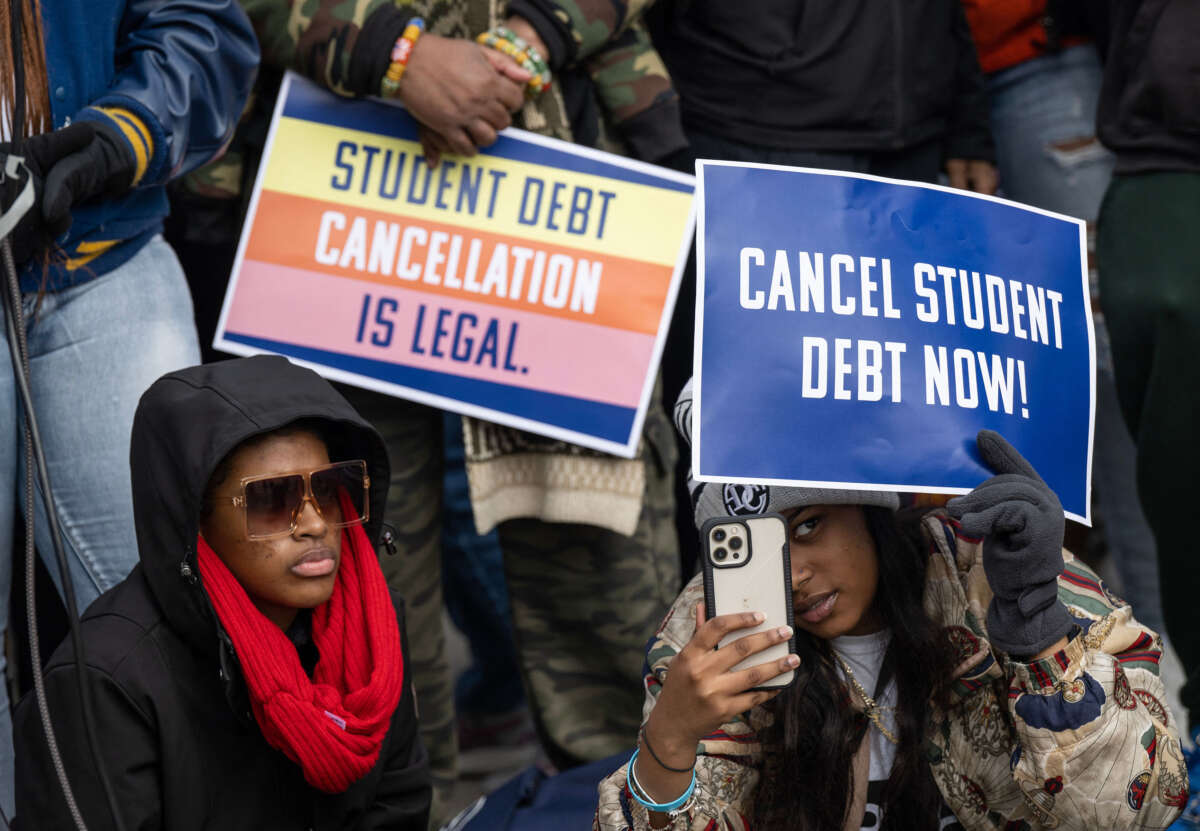Campaigners have issued a “red alert” over language included in the 2024 Federal Aviation Administration Reauthorization Act that could pave the way toward banning student loan cancellation.
The current draft of the routine bill bars executive branch officials from cancelling or forgiving student loans taken out to pursue flight training or education at the undergraduate level, the Debt Collective warned on Wednesday.
“They’re trying to make relief illegal,” the group posted on social media.
Buried 1,000 pages in, the language flagged by the Debt Collective comes under the heading, “Prohibition on mass cancellation of eligible undergraduate flight education and training programs loans.”
“The secretary, the secretary of the treasury, or the attorney general may not take any action to cancel or forgive the outstanding balances, or portion of balances, on any federal direct unsubsidized Stafford loan, or otherwise modify the terms or conditions of a federal direct unsubsidized Stafford loan, made to an eligible student, except as authorized by an act of Congress,” the text reads.
The Debt Collective named Sen. Chuck Schumer (D-N.Y.), Rep. Hakeem Jeffries (D-N.Y.), Sen. Maria Cantwell (D-Wash.), Sen. Tammy Duckworth (D-Ill.), and Rep. Rick Larsen (D-Wash.) as particularly responsible for the language.
“Forty-five million student debtors need to see this and get very, very loud,” the group said.
🚨🚨🚨This is a red alert 🚨🚨🚨
— The Debt Collective 🟥 (@StrikeDebt) April 4, 2024
Congress wants to make student debt cancelation ilegal. Specifically @SenSchumer @RepJeffries @SenatorCantwell @SenDuckworth & @RepRickLarsen
45 million student debtors need to see this & get VERY VERY loud 📢📢📢 pic.twitter.com/reJXQ9Ko5J
While the language only prohibits the executive cancellation of a certain subset of loans, experts and advocates warned lawmakers would not stop there.
“Make no mistake, this is a test flight,” author and Debt Collective co-founder Astra Taylor wrote on social media. “If they can make student debt cancellation illegal for some people, they will do it for others. Student debtors and their allies need to stick together and stick up for each other.”
Taylor urged anyone concerned about the language to contact the legislators flagged by the Debt Collective.
The Debt Collective called the language a “test run.”
“If Congress will stop debt relief for pilots now, they’ll do it to nurses tomorrow, teachers the next day, and social workers the day after,” the group said.
Former Ohio state Sen. Nina Turner, meanwhile, called out the lawmakers for hypocrisy.
“The same members of Congress who had PPP loans forgiven, want to make it illegal to cancel student debt,” Turner wrote on social media, referring to the pandemic-era Paycheck Protection Program.
The question of who has the authority to cancel student loan debt has been a major stumbling block for the Biden administration’s efforts to tackle the issue. The U.S. Supreme Court struck down President Joe Biden’s student loan forgiveness plan in June 2023, arguing in part that the administration did not have the authority to forgive as much debt as it had without authorization from Congress.
Despite the ruling, the administration has found ways to forgive $143.6 billion for almost 4 million borrowers, though that’s only a fraction of more than $1.7 trillion Americans owe in student loans.
Media that fights fascism
Truthout is funded almost entirely by readers — that’s why we can speak truth to power and cut against the mainstream narrative. But independent journalists at Truthout face mounting political repression under Trump.
We rely on your support to survive McCarthyist censorship. Please make a tax-deductible one-time or monthly donation.
